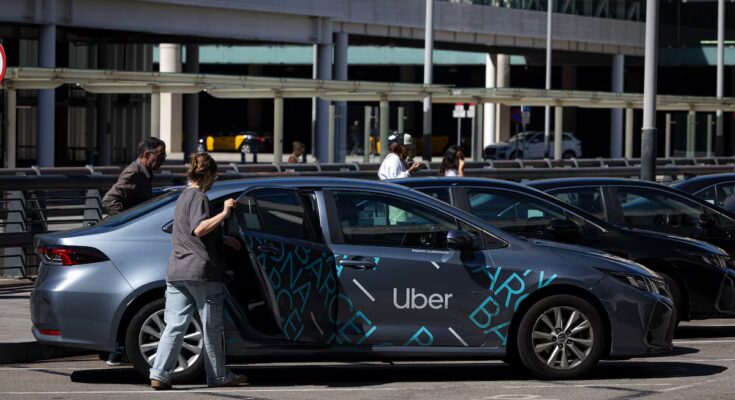Digital platforms offer terrible working conditions, much worse than those of the average job market. Behind the veil of novelty and technological innovation lies a system of low wages, poor prevention of professional risks and almost no rights taken for granted for the rest of the workers. This is the main conclusion drawn from the second report Fairwork Spainprepared by Complutense University and the May Day Foundation (associated with CC OO), based on a methodology implemented by the Internet Institute of Oxford University, published on Wednesday. It consists of evaluating working conditions on platforms using ten basic principles. Compliance with each of them awards one point. In Spain, of the seven platforms analyzed, three remain empty (Taskrabbit, Cuideo and Glovo), Uber obtains two points and Cabify and Livo three points. They all fail, except the only one that passes, Just Eat, with seven points out of ten possible.
The researchers observe a progressive improvement in the working conditions of food delivery and VTC (driver-driven transport vehicles), where legislative and executive action has been concentrated in recent years, but at the same time they identify greater precariousness in platforms dedicated to other sectors, such as healthcare and domestic sectors.
The report’s findings carry an important asterisk: Glovo, the leading food delivery platform, was analyzed before hiring its delivery drivers, after years of rebellion against the Supreme Court (which recognized the delivery workers’ employment relationship in 2020) and the knight’s lawwhen he operated with fake self-employed workers. “This breakthrough represents a triumph of policies aimed at employing the delivery sector, in line with Spanish legislation and the European directive on platform work,” the report claims. Thanks to Glovo’s change, the researchers explain, for the first time “the majority of delivery activity on the platforms is carried out in Spain according to a paid model”. The company took this step under the threat of criminal proceedings against its top executive, Oscar Pierre, and after being punished with millions of euros in fines.
The analysis of Fairwork Spain gives a zero to the old Glovo model. This means that the platform did not ensure that employees earned the minimum wage (16,576 euros gross per year, 9.26 per hour), nor a sufficient living wage (to guarantee a certain purchasing power), nor did it mitigate occupational risks, nor did it guarantee safe working conditions. Neither has it provided clear and transparent conditions, nor has it ensured the non-imposition of unfair contractual clauses, nor has it guaranteed an adequate procedure for making decisions affecting workers. Finally, it did not provide a fair management process, nor guarantee freedom of association, nor promote democratic governance.
The “labourisation” of Glovo, the report admits, “has enabled concrete progress, such as the establishment of the first company committee of delivery workers”. But, at the same time, he points out that Glovo “has not incorporated its entire legacy workforce, resorting to subcontracting via delivery fleets” and that to this problem “we should add other persistent problems in the sector such as low wages, involuntary part-time hiring and lack of algorithmic transparency.” The report takes up a point from the company: it underlines that the new model “has not yet been the subject of empirical analysis” and that it guarantees “direct labor negotiation, the application of collective agreements, the creation of works committees, human management channels and compliance with professional risk prevention obligations”.
A zero from Cuideo and Taskrabbit
Glovo’s zero is limited to the previous model, but other platforms get the same grade with the one they stay in place. This is the case of Cuideo, dedicated to the care of non-self-sufficient people, or of Taskrabbit, focused on repairs and removals. The report highlights that the former acts as an employment agency “transferring the responsibility of hiring to families or hospital centers and not taking on any role as an employer”. The researchers argue that this situation “generates deficits in the prevention of professional risks, in the exercise of collective rights, in transparency regarding the use of data or in the implementation of efficient communication channels”. For his part, he underlines that Taskrabbit is based on self-employed workers with “fewer guarantees and rights than employed work”. This platform is best known for its partnership with Ikea for furniture assembly.
The result is slightly better for Uber, with two points: the report indicates that this company guarantees the minimum wage to its employees and freedom of association, but does not respect the other eight principles. The analysis of this company focuses on passenger transportation (via VTC), it does not address the food delivery section (Uber Eats). However, the report highlights that it is the only player in this sector that continues to operate with self-employed workers, “which has not gone unnoticed by the Labor Inspectorate, which has already initiated action”, in reference to this body’s investigation into the company.
Uber Eats operates with a hybrid model, combining freelancers and fleets (subcontracted employees), without specifying how many are integrated into each system. The second is the one that applies to all VTCs, excluding self-employed workers according to the company and the Complutense University report. The other major VTC platform, Cabify, gets one more point than Uber. According to the report FairworkIn addition to the colon, Uber gets the reference to providing clear and transparent working conditions. It fails in everything else: it fails in professional risks, in freedom of association, or in the non-imposition of unjust conditions.
Livo, precariousness among nurses
It also gets a Livo three, dedicated to nursing care and to which the report dedicates a large section. “The rapid growth of Livo Health SA since its foundation a couple of years ago shows how the platform economy is expanding in Spain even in highly skilled sectors, such as nursing,” the report claims. He explains that this company, “financed through the Yellow venture capital fund (created by the founders of Glovo and with a capital of 30 million euros)”, was founded in 2023 and began operating in the Barcelona metropolitan area, “connecting nurses with the workplaces that hire them”.
“Livo allows health centers (private or privately run public) to quickly hire nurses to cover their specific needs, while at the same time offering nurses an application from which to access a wide range of job offers,” the report highlights. He believes this technological tool “helps rapidly resolve” the industry’s healthcare problems, but at the same time warns that its emergence “may help perpetuate and intensify the profession’s structural problems.”
A seven for Just Eat
The only platform that approves, with seven of the ten points in contention, is Just Eat. This food delivery company has transformed its compliance knight’s law on a corporate banner, as opposed to the effort to operate with freelancers from Uber Eats and Glovo (already with a salaried model). “The platform has publicly demonstrated for several years its commitment to social dialogue and the collective rights of its workers. Proof of this is that it has already signed two company collective agreements with the main Spanish trade union organizations”, underlines the report, in which it is worth remembering that CC OO participates. The three areas where the report indicates that Just Eat is not compliant are ensuring it earns a sufficient living wage (guarantees the minimum wage), failing to avoid unfair contract terms and failing to provide a fair management process.
This is the second edition of the report Fairwork (works only in English) in Spain, an analysis that is also developing in Germany, France, the United Kingdom, Italy, Mexico, Argentina, the United States and Morocco. Several platforms examined in this edition had already been analyzed last year. Glovo, Uber and Just Eat repeat the score, with a zero, a two and a seven respectively. Cabify improves and goes from two to three points, while Taskrabbit drops from two points to zero. The field work for this second report, led by Complutense professor Alberto Riesco-Sanz, took place in the first semester of 2025.
The analysts conclude that “the Spanish landscape shows significant progress in the formalization of platform work”, with the emphasis on Glovo’s model change. “However, structural challenges related to outsourcing or externalization of work management, fragmentation of responsibilities, low wages and algorithmic opacity persist.” “Labour, while necessary, is only a starting point in building more equitable working relationships within the platform economy,” they conclude.



